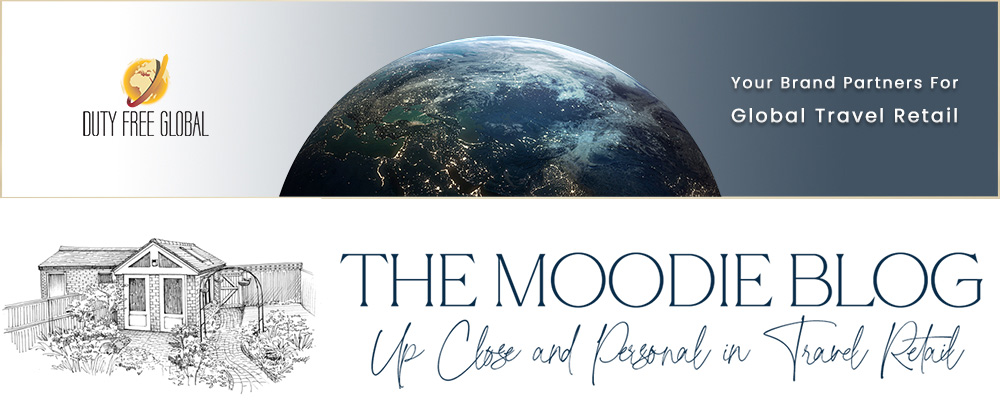Latest posts by Martin Moodie (see all)
- How I overcame Severe Tire Damage to become the oldest influencer in town - April 20, 2024
- Free as a (Kiwi) bird and flying high in Haikou - April 13, 2024
- Discovering Food Accademia’s world of fine flavours at a Hong Kong cha chaan teng - April 6, 2024

My Saudi sojourn is nearly over. After eight days in Riyadh, I’ve opened an Interim Moodie Davitt Bureau at King Khalid International Airport Terminal 1 while I await my flight to Dubai.

Sustained by a tall Latte and turkey and cheese croissant from the Starbucks adjacent to my gate, I’m putting in an early morning shift, having just walked the Riyadh Aelia Duty Free store. Positioned immediately post-security, it offers two routes through – one embracing beauty (mainly fragrance) and fashion accessories; the other featuring tobacco; food & confectionery; destination merchandise; and travel essentials.




As you’d expect, the offer involves plenty of accessibly priced products targeted at returning overseas workers bound for India, Pakistan, Bangladesh, the Philippines and elsewhere. Equally, and reflecting a very different Saudi passenger profile, there’s a Gucci Beauty boutique and premium fragrances from Chanel, Cartier, Dior, Givenchy, Hermès, Tom Ford, YSL and others.


This week I had the pleasure of meeting up after many years with the remarkable Jacqui Davies, Commercial & Business Development Director at Lagardère Travel Retail. I don’t say ‘remarkable’ lightly.

Jacqui, a fellow Kiwi, has been through much in life. She has an indomitable spirit, one forged through both her own determination and freewheeling character and the challenges that life has thrown at her. Every now and again in this world – and in our industry – you bump into someone and have a conversation that makes you reflect on everything that you do and that you stand for. This was such an occasion.
We talked a bit of business, of course, too. Jacqui is proving that a woman can succeed in what is perceived by most outside the Kingdom as a man’s world. Conversely, she finds being a woman no barrier at all; in fact she reckons it helps get things done.
Despite the frustrations of working in awkward spaces in both Terminals 1 and 2 at King Khalid International Airport, Lagardère Travel Retail (trading as Riyadh Aelia Duty Free) is turning in some astounding numbers with sales racing ahead of 2019 levels – up +66% in March and even with an unfavourable Ramadan comparison, ahead +22% in April.


Saudi Arabia is fragrances territory, Jacqui points out, borne of the fact that Saudis grow up with local scents as integral to their daily lives. With tourism set to boom as the country’s overarching Vision 2030 plays out to startling effect – visitor arrivals are set to triple by that year – travel retail will soar, she says, especially with such heavy investment being poured into the airports. To spend time in Saudi Arabia is to see a country transforming almost before your eyes, Jacqui told me.
More of that in a few weeks in the first edition of our new Saudi Travel & Tourism Ecosystem Report, which I’ve been here to research. That ecosystem was the subject of this week’s superb Future Hospitality Summit in Riyadh, one of the best events I have attended in many a year. Speaker after speaker, from both the government and private sectors, outlined how the stars are aligning over the Kingdom’s tourism and hospitality sectors.
Giga-projects with ‘regenerative’ rather than merely sustainable principles at their heart; a new, second national carrier operating out of Riyadh; international hotels opening with astounding regularity; whole swathes of previously almost unknown natural wonders being opened to (measured) tourism for the first time; and so very much more.
Can the execution match the vision? Certainly it won’t fail for lack of will – or funding. I had an excellent interview with Khalil Lamrabet, CEO and Board Member of the
“Saudi Arabia has a very, very rich heritage and culture,” Khalil told me. “There is a lot to see. It is untapped. And people are intrigued. I guess that after COVID people are wanting to discover new and exotic places [that are being developed] in a sustainable way. We do have that and I believe it is one of our main strengths in the Kingdom.”
I also got the chance to catch up with John Pagano, the dynamic CEO of the Red Sea Development Company & AMAALA (soon to be integrated as Red Sea Global). The former is dubbed, “The world’s most ambitious regenerative tourism project” – again, note the term regenerative as opposed to sustainable. “Sustainability is not enough,” John says. “We want to not only preserve habitat but grow habitat.”

The Red Sea Project is taking shape as a unique, luxury tourism destination. It will embrace nature, culture and adventure, while setting what the company describes as new standards in sustainable and regenerative development and positioning Saudi Arabia on the global tourism map.





